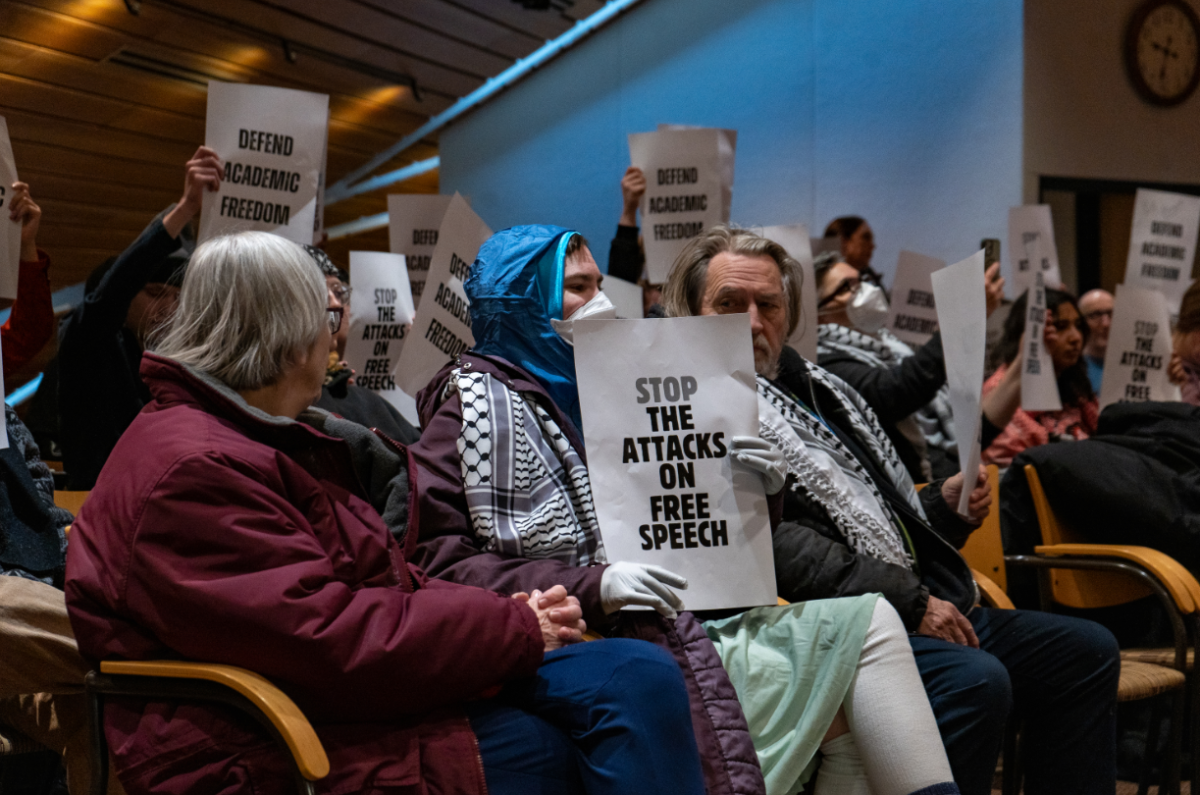
Pooja Singh
Protesters held signs stating “defend academic freedom” and “stop the attacks on free speech.”
The University of Minnesota Board of Regents discussed institutional speech and expansions to academic health at the Feb. 14 meeting.
University President Rebecca Cunningham and Essentia Healthcare CEO David Herman presented new plans for healthcare after it was announced Jan. 24 that the University would be working with Essentia Health.
The Board introduced a resolution on institutional speech stating the president is the primary spokesperson for the University, and statements addressing matters of public concern or interest are no longer permitted.
Protesters gathered in the boardroom vocalizing their discomfort with the resolution.
Institutional Speech
Students for Democratic Society (SDS) interrupted the Board meeting over concerns of academic freedom regarding the proposed resolution for institutional speech.
The resolution defines institutional statements as communications issued in the name of the University and its departments and units.
This policy is connected to a national trend of institutional neutrality which has become increasingly popular as students and universities have become less favorable toward political statements.
Schools like Yale, Northwestern and John Hopkins University have adopted policies of institutional neutrality.
The Board of Regents policy would require individuals to make it clear that they are not speaking for the University when discussing matters of public concern.
Regent Douglas Huebsch said institutional neutrality is necessary for our University because the University is not a political source, and its goal is to remain neutral.
Regent Robyn Gulley was concerned the resolution was too vague. She said it does not differentiate between units, departments and centers while trying to address a specific issue.
“We could use a scalpel, but we use a bulldozer,” Gulley said.
Regent Mike Kenyanya said he was grateful for the feedback, but they did not have enough time to process every comment.
When the board ended its discussion, protesters began to chant statements supporting academic freedom and institutional speech in the boardroom. They shouted “Defend academic freedom” and “Stop the attacks on free speech.”
SDS released a statement explaining the protest on Instagram.
“It is clear that this new proposal is an attempt to control messaging coming out of the University,” SDS wrote. “It should not have to be said that no University president has the expertise to decide what statements should or should not be released.”
The resolution will be voted on at a later meeting.
Academic Health
Cunningham and Herman presented their plan of “a bold new vision for healthcare” at the meeting.
The plan is an integrated strategy the University is beginning with Essentia that focuses on increasing care across the state and addressing “urgent healthcare needs,” particularly in rural communities.
“We are talking about a newly proposed vision that would fundamentally enhance the structure of healthcare,” Cunningham said.
Herman said Essentia values the connection a healthcare provider has with their patients and wants to implement that level of care across the system.
Regent Ruth Johnson spoke in support of the plan, saying it brings a clear solution for practitioners in the state.
“The people of Minnesota and the legislatures in Minnesota care about their communities. Communities increasingly have a presence there and provide services,” Johnson said. “I believe that the legislators and the citizens of those areas will support the university and a greater level of discussion.”
Regent Penny Wheeler said there is hope that future conversations with Fairview will take place.
Fairview’s role in the new plan has not been made clear yet, after the Star Tribune reported that Fairview has said it does not want to work with Essentia.
